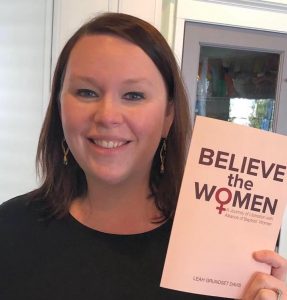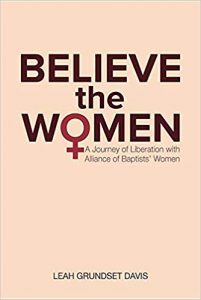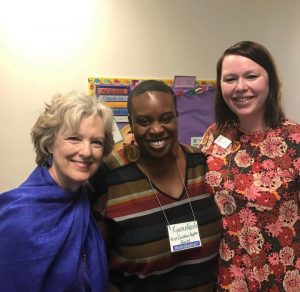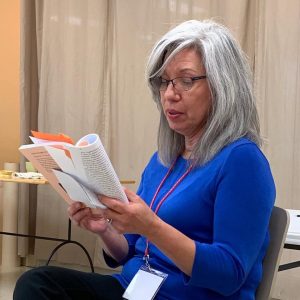Believe the Women, by Rev. Dr. Leah Grundset Davis

The call to “believe the women” echoes through the centuries. Mary Magdalene and the other women proclaimed the Good News of Jesus’ resurrection to the apostles who didn’t believe them (Luke 24: 1-11). People today still too often refuse to believe women who preach Good News and who speak out against abuse and violence. But the voices of women in biblical times and today cannot be suppressed. Mary in the Magnificat (Luke 1: 46-55) challenged unjust powers, and women today proclaim liberation and justice and rise up in the #MeToo and #ChurchToo movements.
 Although told she couldn’t be a pastor, Rev. Dr. Leah Grundset Davis persisted in following her call. Today she is pastor of Ravensworth Baptist Church in Annandale, Virginia, and the author of a recently published, inspiring book, Believe the Women.
Although told she couldn’t be a pastor, Rev. Dr. Leah Grundset Davis persisted in following her call. Today she is pastor of Ravensworth Baptist Church in Annandale, Virginia, and the author of a recently published, inspiring book, Believe the Women.
The Foreword to Believe the Women is by Rev. Dr. Amy Butler, also told she couldn’t be a pastor but is now pastor of Riverside Church in New York City. In the Foreword she writes that “God’s spirit will show up wherever she wants, creating new life inside and outside of institutions that have built walls and excluded certain people and tried to harness her work of redemption in the world.” Rev. Dr. Butler recommends Believe the Women as a “collection of theological work, sermons, and personal stories that remind us that we ignore the prophetic voices of women at our own peril, for they have kept—and they will keep—raising their voices and calling us to fix broken systems.”
Believe the Women features Alliance of Baptists clergywomen, and it will touch women of all denominations who continue to find their voices suppressed, devalued, and/or marginalized. Also, the book reaches out to all people with inspiration to follow the Spirit’s call and to proclaim justice and liberation for all. Rev. Dr. Davis includes in this book one of her sermons on Mary’s Magnificat in the Gospel of Luke. She challenges the congregation: “What might the world sound like if we all sang our songs about God’s justice-love as boldly as Mary did? Our songs would be powerful and point us to new understandings of God and one another. We would believe each other!” She continues that she believes Mary “that God is making all things new. . . . that God’s mercy is for the Dreamers and everyone else, that the proud will be scattered and the powerful knocked down from their thrones or oval offices or halls of Congress or Hollywood studios. . . . that God has lifted up the lowly to empower them and amplify their songs that the world needs to hear so we can all more fully be ourselves.”
Believe the Women challenged and inspired me. Rev. Dr. Davis graciously agreed to an interview about her new book. It was a joy to read the book and to interview her. Here are her responses to my questions.
How did you decide to focus on the Magnificat in your book Believe the Women?
The Magnificat has been a formative text for me, and I had this idea that just maybe it had been for other women too. And it turned out, I was right! It’s this beautiful song of justice and hope, promise and power, and I’ve always connected with Mary singing it in the Gospel of Luke.

Why did you choose to lift up the voices of Alliance of Baptists women preachers in this book?
I was working on my Doctor of Ministry degree and that final project was the basis for this book. At the time, I was working for the Alliance of Baptists as the communications specialist, and I was noticing we needed to lift up the stories of Alliance clergywomen.
Recount your call to ordained pastoral ministry. How did women you feature in your book influence your call?
When I was 10, I knew I wanted to be a pastor. I grew up in a Southern Baptist Church that was formative for me, but the year was 1992 and it was at the height of the schism. So at 10, my pastor told me I couldn’t be a pastor because I was a woman. My road to ordained ministry was long and winding, never doubting that I could be a pastor, but wondering if I as a woman would ever receive a call to be one in a local church. Nancy Hastings Sehested and Isabel Docampo were early supporters of the Alliance, and I had heard their names. When I finished college at Baylor and began seminary at Truett, Rev. Julie Pennington-Russell was my pastor and all of a sudden, I saw a woman being a pastor. That’s when everything changed and I knew that I would pursue this no matter the obstacles because I felt a deep calling.
How does Mary’s song relate to the song you feel called to sing?
Mary’s song is one that I feel like I can sing every day. With the injustice we see around us, I can sing the Magnificat. With the pain and grief that circles, I can sing this song. In the same way, I can sing this song with joy and celebration. For me, Mary’s song is one that grounds me in my belief that God is love, and God’s hope calls us forward in the reality of our context.
Have you ever questioned your Baptist identity? Why have you remained in the Baptist denomination?
Yes! I tried so hard to not be Baptist when I was in seminary because I knew it would be a hard road to find a pastorate. But as it turns out, I’m Baptist raised and it really is who I am. I believe in what we proclaim—that we all have a direct connection to God, that with soul liberty both we are free and at the same time always demanding that others be free. The way we voluntarily organize ourselves as Baptists is a good match for me, both in my congregational leanings and my pastoral leadership.
What compelled you to write Believe the Women?
Once I hit submit on my Doctor of Ministry final project, I knew I needed a break, but I also knew I wasn’t done with this work. I wanted a larger audience to know of the stories of these six courageous Alliance clergywomen.
How do you answer those feminists who believe that the Bible is misogynistic and cannot be a helpful resource for dismantling patriarchy. Why do you draw from the biblical story of Mary in your book?
I think a lot of the writers of the Bible were misogynistic! But what I also know is that God’s calls for equity and justice are always there—sometimes in between the lines, sometimes on the margin of the text. As we interpret and re-tell the stories, we have a chance to lift up the voices that have too long been neglected and share their stories in the light of God’s liberating love.

How do the stories and sermons of Rev. Dr. Isabel Docampo and Rev. Maria Swearingen illustrate intersectional feminism? Are there other women featured in your book who also draw from the intersection of justice concerns?
This work of intersectionality was one that I could only dip my toe into for a little book. I was living with the work of Dr. Kimberlé Crenshaw and asking how do intersections influence how we preach and how we interpret the biblical text. Without writing a tome, I think Isabel’s story tells about what it meant to be Cuban-American and a mujerista theologian and Baptist in the United States South, and she preaches from that place. Maria preaches with attention to her identity as a Puerto Rican, queer woman, who can’t stop being Baptist. When we lift up these stories, we learn so much about these women, ourselves, and our Creator. I think all the women in the book touch on some form of intersectional justice concerns.
The voices of current-day women are still stifled by many churches who deny them opportunities for pastoral ministry. How do you see your generation opening more doors for women to sing the songs they feel called to sing? What is your hope for this book?
I think we are poised for more and more women to be singing freely. Transwomen are being ordained in Baptist churches and the world is hearing a whole new song—more songs of the beauty of God’s creation. It is still difficult to find pastoral positions, but the songs of liberation are only getting louder and bolder. Women, who have known of the oppressive weight of patriarchy, are leading the choir now–singing boldly against Islamophobia, Anti-Semitism, racism, white supremacy, and hate. We’ll keep singing just like Mary—we have to.
What’s one question about your new book you’d like to answer that I didn’t ask?
What comes next for Believe the Women? At the Alliance of Baptists Annual Gathering, I was speaking with a group of women pastors from Cuba, and they asked me if this would be translated into Spanish. My hope is that we can next gather stories of these pastors and their stories in Spanish and share them widely!

Rev. Dr. Leah Grundset Davis began as pastor at Ravensworth Baptist Church, Annandale, Virginia, in September 2017 in a new model of shared pastoral ministry. Leah previously served as communications specialist at the Alliance of Baptists and Associate Pastor at Calvary Baptist Church, Washington, D.C. She graduated in May 2017 with a Doctor of Ministry degree from Candler School of Theology at Emory University, focused on Baptist women preaching the Magnificat. Her seminary studies were conducted at Baylor’s Truett Seminary where she received a Master of Divinity degree in 2007. Leah graduated from Baylor University in 2004 with a Bachelor of Arts degree in Journalism and Religion. She lives in Bristow, Virginia, with her husband John, and two young daughters.
That was awesome, so hopeful! All of these women singing together for change is exciting and necessary. Thank you for sharing!
Thank you, Colette, for your comment and for all your creative work for Her healing change!